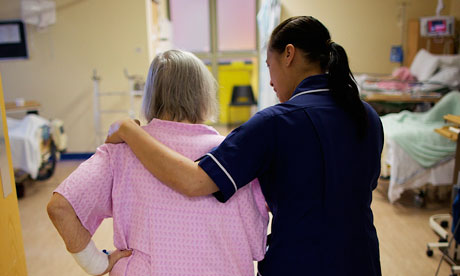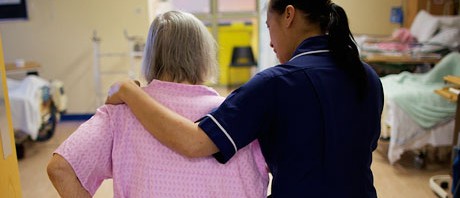
NHS care, especially of the elderly, was heavily criticised in a study by the Patients Association. Photograph: Christopher Thomond for the Guardian
NHS care is under renewed scrutiny after a damning new report on Wednesday highlighted how some patients were denied pain relief, told by nurses to go to the toilet in their seat and left without food and water.
The NHS is ignoring patients’ needs because of “a systemic problem” which requires an overhaul of hospital procedures to eradicate neglect by staff, warns the Patients Association, an influential campaign group, in a study which details 16 cases of appalling care inflicted on people who were already very unwell.
The Department of Health responded by pledging to “root out” poor treatment wherever it occurred and work with the NHS until the problems identified in the dossier were resolved.
The association’s report follows a series of critical reports about standards of NHS care in some areas, especially of elderly patients, by watchdogs such as the Care Quality Commission and charities such as Age UK.
The report said: “In the 21st century, in one of the most developed countries and health systems in the world, patients should not be left starving or thirsty, they shouldn’t be left in pain and they shouldn’t be forced to urinate or defecate in their bed because the nurse designated to them says it’s easier for them to change the sheets later than to help them to the toilet now. Yet this is what is happening around the country every day.”
The report highlights cases including those of:
• George Taylor, an 83-year-old insulin-dependent diabetic, who was admitted to Chase farm Hospital in north London in August. “On one occasion during his time on the ward, dad was sat in a chair by his bed and needed the toilet. He asked a nurse to assist him, but was told that she was too busy and that it would be easier for her if dad relieved his bowels in the chair,” Gaynor Marshall, his daughter, said. “My mother was quite horrified when she turned up in hospital to discover dad sat beside his bed, quite literally sitting in his own faeces.”
He was also left unwashed and unshaved, and had a pair of urine-soaked pyjamas put into his bedside cupboard rather than cleaned, Marshall claimed. The hospital pledged to investigate these claims and acknowledged that it was “unacceptable” for a nurse or healthcare assistant to have told him they were too busy to take him to the toilet.
• Michael Groves, aged 77, who had pancreatic cancer and was treated at Stoke Mandeville Hospital in Buckinghamshire. His care was so poor that at one point he told his family that “nobody cares in here what happens to you”, according to his daughter, Carole Brown, an ex-nurse. He was denied pain medication and on one occasion told to eat ice cream with his fingers because no spoon was available.
“We acknowledge that there were some elements of Mr Groves’s basic care that fell below the standard we expect on our wards”, said the hospital, which also admitted that staff had failed to display courtesy and compassion.
“The accounts of care contained in this report shame everyone involved,” said Katherine Murphy, chief executive of the Patients Association. “How our elderly patients are treated when they are vulnerable and in need reflects on the whole of the healthcare profession. Help with toileting, eating, pain relief and good communication are basic human rights. Treating all patients with dignity and respect should be a priority for all NHS staff.”
She urged hospitals to introduce independent clinical “patient safeguarding champions” who would identify wards where “a long-term cultural change is required” in how patients are treated and scrutinise quality of care until elderly patients are being looked after properly.
A DH spokesman said: “Everyone admitted to hospital deserves to be treated with compassion and dignity. Many parts of the NHS provide really good care, but some sadly fall short of what we demand. That’s why we asked the Care Quality Commission to carry out unannounced inspections on issues including patient dignity and nutrition. So far, 100 inspections have already been carried out and 700 more will be carried out next year.
“Wherever there is poor performance we will root it out, and whatever the reason for that poor performance we will tackle it.The Patients Association is right to raise these examples and issues, and we will work with them and with the NHS to sort these problems out.”
Sir Keith Pearson, chief executive of the NHS Confederation, which represents hospitals, said he was “deeply saddened at persistent reports of unacceptable care in NHS hospitals. He blamed a lack of leadership and urged hospital bosses and staff to respond to the challenge of ensuring proper patient care. While “many organisations and individuals are doing this superbly well … we need to understand why we are getting it wrong in some hospitals and not in others, and how we can get this right every time for every patient,” he added.
‘He felt he was gasping for his life’
William Wood, a married father-of-three who had always enjoyed good health, was admitted to York district hospital on 17 December last year after finding it increasingly hard to breathe. Swine flu concerns saw the 52-year-old put in a room on his own until his illness was identified as pneumonia and he began receiving oxygen.
“In my opinion during this time [in the side room] he received no nursing care at all; his breathing was getting worse and Bill felt that he was not receiving the attention that he needed,” his wife Sheila claimed in the latest report from the Patients Association, We’ve Been Listening, Have You Been Learning?
She continued: “He told me that at one point during the night of 18 December he pressed the emergency button because his breathing had become so laboured he felt he was gasping for his life. It was a full 15 minutes before anyone responded to him. To take so long to answer when a patient is known to have breathing difficulties is atrocious. He could have died in that time.”
She alleged that he and his family were also not told what was being done to tackle his condition and he received no help when his ankles, legs became swollen.
He was suddenly discharged on 22 December. “I was at a loss to understand how someone who needed oxygen to manage his breathing difficulties could suddenly, and without warning, be judged to be healthy enough to be discharged from hospital. He wasn’t even able to walk to the car he was so ill,” she recalled. Three days later, on Christmas Day, at home with his family, he collapsed and died.
His wife cannot understand why medical staff did not realise how dangerously unwell he was. “The coroner’s report showed my husband had chronic pneumonia, with one lung completely solid and another three parts solid. In a modern hospital, with all of the resources available to them, how does that get missed? Why was he sent home without any oxygen given that he had been on oxygen throughout his time at hospital?
“I would not wish anyone to have the lack of treatment that I witnessed. I have lost the man of my life, my children have lost the best father ever and it was all so unnecessary, had the right care and attention been given.”
York teaching hospital NHS foundation trust said it was “profoundly concerned and saddened” by what happened to Wood. Independent experts said that Wood’s treatment as an inpatient did not significantly fall short of good clinical practice, but held that there had been “major failings in his clinical assessment at the time of discharge”. In a statement the trust said: “Our care fell significantly short in respect of his discharge. We recognise with great regret that this has contributed to so sad an outcome.”
guardian.co.uk © Guardian News & Media Limited 2010
Published via the Guardian News Feed plugin for WordPress.


4 Responses
I’m pretty sick of them underfunding and understaffing wards and then blaming a “culture of abuse” for things like this – it is another way of undermining the NHS and preparing people for privatisation.
@Kat …. I completely agree with you…. Run down the NHS and bring in private practice in the guise of saving the day….remember Southern Cross was private ..£1000+ a week to be abused ….
Shocking but looks whats happening here. Its the same tactic as is used with disability benefits, whenever the NHS bill comes up the media is fed another story about poor care in the NHS. Its to soften people up to the destruction of the NHS.
I agree! (JJ)